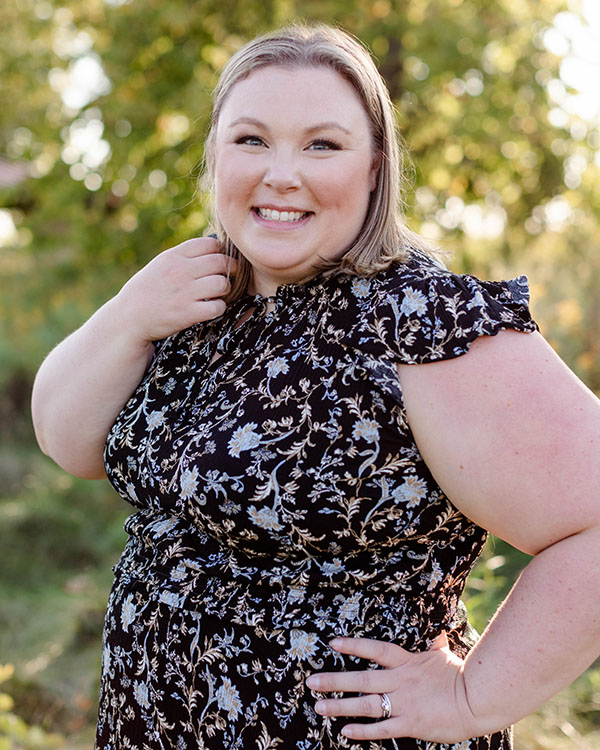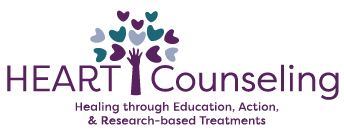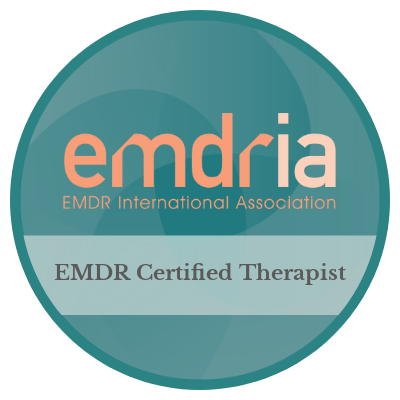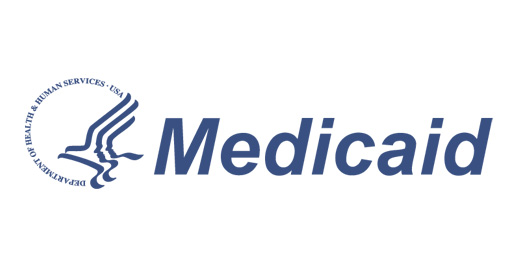Erin L. Neill, PhD, LCSW
Founder & Owner/President
EMDR Certified Therapist TM & EMDR Consultant-in-TrainingTM
pronouns: she/her/hers
I am a trauma specialist with experience seeing clients with a range of issues from childhood abuse or neglect, sexual abuse, sexual assault, domestic violence, accidents, natural disasters, survivors of violence, and first responders.
Dealing with these kind of events are life changing. They can affect your ability to sleep, eat, and function enough to go to work or school or to enjoy your life. Trauma can cause nightmares, reliving the event (flashbacks), or feeling on edge or that you have to watch over your shoulder (hyper vigilance). Not to mention feelings of sadness, anxiety, worry, anger, guilt, hopelessness, worthlessness, and more.
Trauma affects our ability to feel safe in the world and that we can trust others. This makes it hard to form and maintain healthy relationships. If your past is affecting your ability to be a good friend, partner, parent, etc. in the present, let’s work together to make sure it doesn’t continue impacting your life and your future.
Your trauma is not too big.
It’s pretty hard to scare me. Don’t worry that what has happened to you in your past is “too much.” I’m here to listen, sit with you in your pain, and hold those stories with you.
Don’t worry that what’s going on with you isn’t “bad enough,” either.
So often clients tell me, “well it wasn’t that bad,” or “other people have(/had) it worse than me.” You are deserving of help and support. I would be honored to hear your story and support you.
Let’s move forward together.
I am passionate about helping trauma survivors heal from their past so that they can continue moving forward instead of feeling stuck. If something bad has happened to you, I would love to help you build your coping skills and (re)process your trauma so that you can build healthy relationships, hold healthy boundaries, and feel better.




I created HEART Counseling because I believe that health and healing can be achieved through education, active participation in your treatment, and the use of effective, researched-based treatments.
Education and Learning
I believe when you come to therapy you should learn. You should learn more about yourself and your experiences, and how they shaped the person you are. You are the expert on you, and your therapist should want to learn all about you. I also believe that you should learn from your therapist; they should teach you new coping skills and educate you about managing and treating your symptoms.
Active Participation
I believe strongly that a person’s overall health and healing can be achieved by being an active participant in their own treatment. When you come to therapy, it’s not “just” to talk (although that can help to a point); it’s to work with your therapist to make a plan and actively engage in your treatment. In therapy, you should feel like you are making progress, even if it’s very slow progress.
Tailored, Effective, Research-Based Treatments
I believe in the use of effective, research-based treatments. I think that these treatments should be chosen and thoughtfully adapted for each individual.
Trauma Treatments I Offer
Two of the most evidence-based (aka: best) treatments for trauma exposure and Posttraumatic Stress Disorder (PTSD) are Eye Movement Desensitization and Reprocessing (EMDR) and Cognitive Behavioral Therapy (CBT), and I have extensive training in both of these modalities.
EMDR
Sometimes clients come to me because they have tried traditional “talk therapy” before and it has only helped to a point. They are looking for a way to feel better and for their symptoms to stop interfering with their life. Enter EMDR. I am an EMDR Certified TherapistTM.
CBT
Before EMDR was well known, CBT was the “gold standard” for treating trauma exposure and PTSD. I’ve spent more than 15 years learning about, studying, and utilizing CBT in my practice. I also have specific training in TF-CBT, or Trauma-Focused Cognitive Behavioral Therapy, a treatment specifically for kids and teens who have experienced traumatic events.
CBT is also used to treat anxiety and depression, and I have a wealth of experience treating these conditions as well. I love seeing the ways my clients manage and overcome their anxiety to enjoy their lives more.
Strengths-Based Approach
As a social worker, I believe that you already have the resources and tools you need to heal within yourself. Sometimes we just need help finding and using those tools.
Trauma-Informed Approach
To me, being trauma-informed means that trauma is the lens I use to see my clients and the world. I assume that something bad has happened to all of us. Sure, some people have experienced more traumatic events than others, but it is not possible to live in our world today without something bad affecting our lives.


I am a strengths-based, trauma-informed clinical social worker. We all have the strength within us to heal, we may just need someone to walk along side us and remind us of that strength from time to time.
I work with kids as young as 10, teens, college students, young adults, and adults. I’m also particularly passionate about perinatal mental health and working with parents at all stages.
I care deeply for my clients and am passionate about helping them live their best lives. I often use humor in my sessions and love to connect with clients on their interests.
Education
- Doctor of Philosophy (PhD) in Human Development and Family Studies, Iowa State University
- Master of Science (MS) in Applied Developmental Psychology, University of New Orleans
- Master of Social Work (MSW), University of Pennsylvania
- Bachelor of Arts in Psychology (BA), The Catholic University of America
Research
Dr. Neill has an extensive educational background and training in the clinical and research applications of evidence-based treatments for trauma exposure and PTSD, experience teaching at the university level, as well as authorship of over 25 peer-reviewed journal articles and conference presentations of original research.
Espil, F. M., Rettger, J., Weems, C. F., Neill, E. L., & Carrion, V. G. (2021). Measuring the fidelity of a school-based yoga and mindfulness curriculum for youth: A transdisciplinary feasibility study. Child & Youth Care Forum, 50(1), 57 -75. DOI: 10.1007/s10566-020-09558-1
Weems, C. F., Camp, R. D., Neill, E. L., & Scott, B. G. (2020). Developmental differences in child and adolescent reasoning about anxiety sensations. Cognitive Therapy and Research. DOI: 10.1007/s10608-020-10182-5
Weems, C. F., Russell, J. D., Neill, E. L., & McCurdy, B. (2018). Annual Research Review: Pediatric posttraumatic stress disorder from a neurodevelopmental network perspective. Journal of Child Psychology and Psychiatry. DOI: 10.1111/jcpp.12996
Neill, E. L., Weems, C. F., & Scheeringa, M. S. (2018). CBT for child PTSD is associated with reductions in maternal depression: Evidence for bidirectional effects. Journal of Clinical Child and Adolescent Psychology, 47(3), 410-420. DOI: 10.1080/15374416.2016.1212359
Neill, E. L. (2017, Apr. 25). The role of parents in mental health and trauma therapy. Iowa State University Extension and Outreach: Science of Parenting blog.
Weems, C. F., Russell, J.D., Banks, D. M., Graham, R. A., Neill, E. L. & Scott, B. G. (2014). Memories of traumatic events in childhood fade after experiencing similar less stressful events: Results from two natural experiments. Journal of Experimental Psychology: General, 143(5), 2046-2055. DOI: 10.1037/xge0000016







